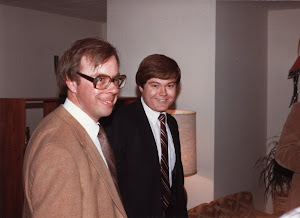1. What does this past Kansas debater look like now?

2. What does this ex-debater now do for a living?
He is a Professor of Business Law at the University of Texas, Austin, School of Business and a Professor at the Law School.
3. Has this former debater been "in the news"?
He's trying. In 1998, the Competitive Enterprise Institute published Frank's monograph Could Kyoto Kill? The Mortality Costs of Climate Policies. Frank published a summary on CEI's webpage, December 1, 1998:
...the greatest health costs of requiring greenhouse gas emission reductions undoubtedly would result from the economic costs of such a policy. As one recent study noted, "any public policy that leads to declining disposable income, such as environmental regulations, is likely to have significant adverse health effects" from injury and disease. The Kyoto Protocol, by itself, is expected to cost between $7 billion and $1,830 billion, according to recent estimates. Using a conservative estimate that regulatory costs of $10 million induce one premature mortality shows that climate policies will result in an estimated 700 to 183,000 additional deaths each year.Frank is concerned about the tradeoffs people will make: "Money spent on increased energy costs is unavailable for the purchase of smoke detectors, fire extinguishers, bicycle helmets, and other product that protect health. Greater wealth also increases access to health care and education."
By the way, using Frank's method, I calculate that the economic cost of the Iraq war will kill around 20,000 Americans annually, or upwards of 30,000 to-date. I await CEI's followup analysis.
4. What else do we know?
Well, on August 29, the much-read legal blog The Volokh Conspiracy noted the preliminary results of Frank's ongoing empirical study about the effects of Chief Justice William Rehnquist's on-and-off absence from the Supreme Court. When Rehnquist is out, Justice John Paul Stevens (appointed to the federal appeals court by Richard Nixon and to the Supremes by Gerald Ford) presides:They quoted our KU alum directly:
I have completed a preliminary analysis of the 2004 term. There appears to be some result from Rehnquist's absence on outcomes. For example, in the cases over which Rehnquist presided, he had a 10% dissent rate. In the cases over which Stevens presided, Rehnquist had a 30% dissent rate. While this is a fairly small sample, and the changed probability of a Stevens dissent is much less, this is suggestive that Rehnquist's absence may have had an effect.Frank is a frequent commenter on Volokh.
I went by their appearance at oral argument with help from some of your readers and found 40 cases for Stevens and 30 for Rehnquist, just using cases with full argument and full opinion.


No comments:
Post a Comment